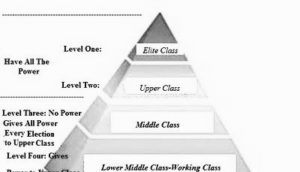class system- Introduction
Society has always been stratified and the stratification takes place in the order of subgroup or class. The class in which different kind of people is placed according to their occupation, economy, caste and wealth is termed as a class system. This class system is a global phenomenon in which people of the same order are placed in a particular group which makes it different and specifies relation with other subgroups. This system was first believed to be classified majorly because of economic strength but then sociologists claimed that there are other factors too.

A basic characteristic of the Class system was that it was not political or religious defined, unlike the Estate system. More than economy other factors also came into the picture in the 17th century. Many sociologists agreed that the class system is purely maintaining an order of groups in a hierarchical manner keeping its classification based on many factors. Within the time, class system emergence, development, and importance emerged as differently by scholars.
Ogburn and Nimkoff explained this system as the union of different people belonging to the same level by any factor, be it caste, wealth or occupation. For example in a school where some of the students belong to age 16 and 17 respectively study and sit in 11th and 12th class respectively due to their age factor. Hence a class system is observed in the above example where people are divided into subgroups.
Father of Conflict Perspective gave another opinion in which he stated that the class system is a relationship between influential people and lower class people in which the former takes the maximum usage of later by any means. Marx claimed that the production rate is in a proportional relationship with people in subgroups. More the people have a higher position in the group, more they are accountable for wealth and production rate. For example, a steel company is run by industrialist Naveen Jindal, his position is the highest in the company thus his wealth and production rate is higher than any other employee at any level.
Marxist also studied the pattern of class division and stated that the power lies in the hand of those handful of people who can control the production rate. And also there are some people who are a part of production but they are not the controlling factor. Apart from these he also cleared that class system has just modified with passing time, for example, that in the 13th century a peasant who worked day and night to earn some money from the leader of this group is similar to the person working as an employee in any company in the 21st century.
Weber also put his point on the class system that the person who is willing to achieve more and has achieved much than other people gradually becomes the person ruling the class system, whereas the person who lacks behind in the race becomes a commoner. He put this differentiation on the basis of achieved status.
Maclver also put his point on the class system that society will always have a social class that is the society will always be stratified under the notion of high-class people and low-class people.
I am Prerna Jha, pursuing mechanical engineering from KIIT, Odisha, But I Love to Read and Write Sociology Related Concepts and Theories. I have done schooling from MVM School, Bilaspur. I have interest in writing love stories or any specific genre. I pursue a great interest in quilting. Right now I am an aspiring writer who writes for various pages. I have participated in many social events. I am a social animal who likes to have maximum participation in any fest.
